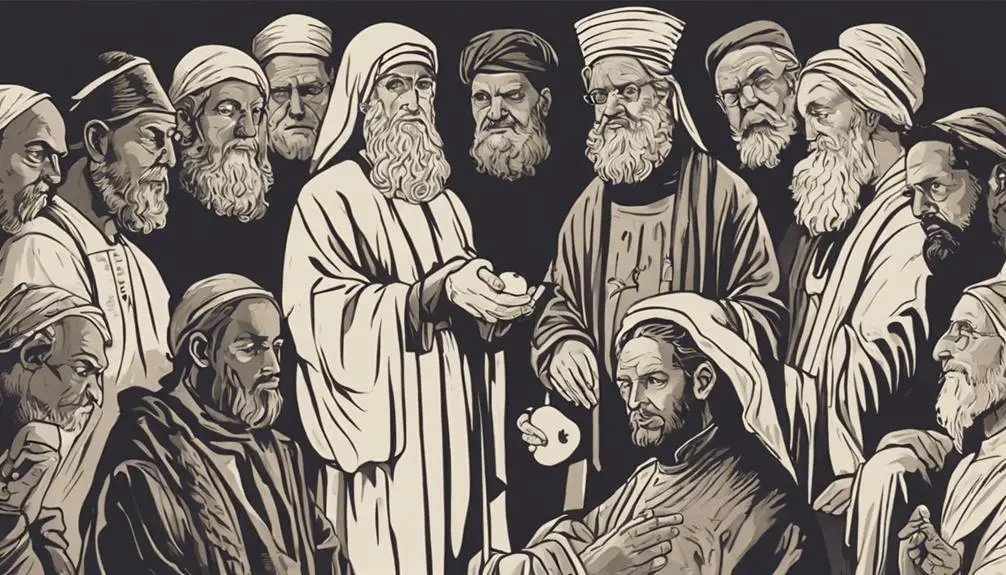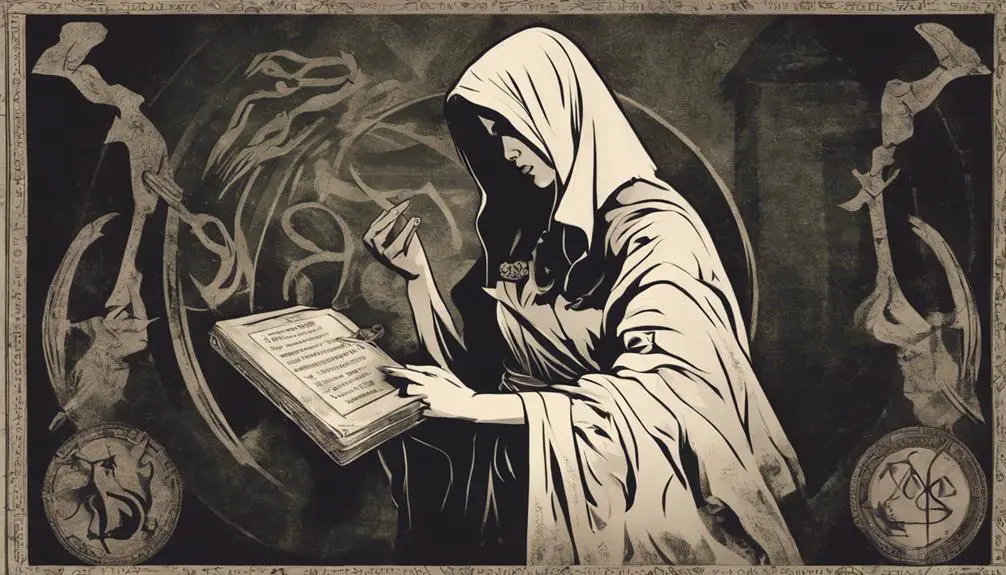Scrutinizing biblical 'immoral women' uncovers layered narratives that question our interpretations of morality, femininity and religion – are they cautionary tales, or misunderstood metaphors?

Immoral Woman in the Bible Meaning
You might not be aware that the Bible's portrayal of 'immoral women' is more nuanced than you'd initially think. The term, often associated with sexual misbehavior, can also refer to broader ungodliness.
In the Bible, such women, like Jezebel or the seductress in Proverbs, serve as cautionary figures, their narratives layered with symbolism and metaphor. What's fascinating is how their stories have significantly shaped societal perceptions of morality and femininity.
Yet, the question remains – are we interpreting these narratives correctly, or is there more to uncover?
Key Takeaways
- Immorality in the Bible encompasses thoughts, words, and actions against God's laws, often symbolized by female figures like Jezebel and Delilah.
- Interpretations of these immoral women vary across Christian denominations, reflecting differing theological perspectives and societal changes.
- Symbolically, these women represent humanity's departure from divine laws, emphasizing spiritual separation and moral failures.
- Narratives of immoral women have shaped societal norms and attitudes, often reinforcing negative gender stereotypes and patriarchal structures.
Biblical Context of Immorality

To grasp the concept of immorality within the Bible's context, it's crucial to delve into the scripture's particular definitions and interpretations of this term. The Bible's concept of immorality often extends beyond physical acts to include thoughts, words, and attitudes that are contrary to God's laws and principles. Defining immorality in the Bible, thus, isn't merely about identifying specific actions but understanding a broader spiritual framework.
The Bible often links immorality with spiritual unfaithfulness or idolatry, portraying it as a rebellious deviation from God's intended path. You might notice that it's not just about breaking rules; it's about breaking a relationship with God, choosing self over divine guidance.
The consequences of immorality, as depicted in the Bible, are both immediate and far-reaching. Often, these consequences include a breakdown in relationships, societal chaos, and divine punishment. However, it's important to remember that the Bible also emphasizes God's grace and forgiveness, offering redemption to those who repent and turn away from their immoral ways.
In essence, the biblical view of immorality is multifaceted, encompassing not just actions but attitudes and motives, and its consequences impact both the individual and the broader community. It's a concept deeply embedded in the fabric of the biblical narrative.
Notable Immoral Women Figures

Delving into the biblical narrative, you'll encounter several women figures portrayed as immoral, each of whom provides valuable insights into the Bible's complex views on immorality, womanhood, and divine justice. Two figures stand out prominently: Jezebel and Delilah, known for their influence and betrayal, respectively.
Jezebel's influence is infamous. As the wife of King Ahab, she's depicted as manipulative and ruthless, leading her husband and Israel into pagan worship. Her actions not only defied the God of Israel but also led to widespread corruption and the demise of her own family.
On the other hand, Delilah's betrayal is marked by deception and treachery. She's best known for betraying Samson, the man who loved her, by divulging his secret to the Philistines, which led to his downfall. Her actions serve as a stark warning about the dangers of misplaced trust and the consequences of deception.
These women's stories offer profound lessons about the repercussions of immorality, emphasizing how choices rooted in deceit and manipulation can lead to personal ruin and societal destruction. Their accounts remain relevant, providing timeless wisdom about morality and the potential cost of unrighteous actions.
Interpretations Across Denominations

While the tales of Jezebel and Delilah offer valuable lessons, their interpretations vary widely across different Christian denominations. These denominational differences stem from diverse theological perspectives, cultural contexts, and historical traditions.
For instance, in Catholicism, Delilah's deceit towards Samson is often construed as an act of betrayal, symbolizing the repercussions of straying from God's path. Meanwhile, in Protestant denominations, you'll find a greater emphasis on personal responsibility, with Delilah's actions serving as a cautionary tale against succumbing to temptation.
Jezebel's narrative also receives varied treatment. Orthodox Christianity often paints Jezebel as the embodiment of evil and corruption due to her idolatry and persecution of God's prophets. Contrastingly, certain progressive denominations might stress the political dynamics of her story, viewing Jezebel as a strong, albeit misguided, female figure.
These interpretations aren't set in stone. They evolve with societal changes and ongoing theological dialogue. So, it's essential for you to approach these narratives with an open mind, understanding that interpretations can differ significantly based on one's denominational lens. Remember, these stories aren't merely about immoral women but about human frailty, divine judgment, and the potential for redemption.
Symbolism and Metaphorical Meanings

Drawing from the rich tapestry of Biblical narratives, you'll find that the stories of supposedly immoral women carry profound symbolism and metaphorical meanings. This concept, which we might call 'Metaphorical Immorality', denotes the use of these narratives not to condemn these individuals, but to illustrate broader spiritual truths.
The depiction of women as immoral or sinful often serves as a metaphor for humanity's collective departure from divine laws. Take, for instance, the woman caught in adultery in John 8. Her sin isn't simply a personal failing, but a representation of the moral failures of society as a whole, symbolizing our collective inability to live up to divine standards.
Also notable is the 'Symbolic Sinfulness' often attributed to these women. It's not so much about their personal depravity, but rather about illustrating the damaging effects of sin on one's relationship with God. In these narratives, the woman's sinfulness acts as a symbol for the spiritual separation that sin causes.
Societal Impact of Immoral Women Narratives

Beyond the metaphorical and spiritual implications, it's crucial to consider how these narratives of 'immoral women' in the Bible have impacted society over the centuries. You'll find that these stories have far-reaching effects, shaping societal attitudes and norms regarding gender roles and morality.
Firstly, the gender bias implications are profound. These narratives often portray women as temptresses or sinners, fostering stereotypes that have contributed to a broader culture of misogyny and sexism. You've likely observed how this bias can permeate everyday interactions, influencing perceptions of women's moral character and capabilities.
Secondly, these narratives subtly enforce subversive power dynamics. By depicting women as transgressors, they effectively shift blame onto women, minimizing men's responsibility in immoral acts. This dynamic subtly perpetuates patriarchal power structures, reinforcing the idea that women are inherently flawed or inferior.
Frequently Asked Questions
What Are Some Common Misconceptions About the Portrayal of Immoral Women in the Bible?"
You might think the Bible's depiction of 'immoral women' supports sexual double standards or misogynistic interpretations. However, that's a common misconception. The Bible actually teaches equality and respect for all.
Misinterpretations often stem from cultural biases of its readers, not the text itself. Don't be quick to judge based on these misconceptions.
It's always best to delve into the Bible yourself and gain your own understanding.
How Did the Concept of Immorality in Women Change Throughout Different Periods of Biblical History?"
You've asked about the evolution of immorality in women throughout biblical history. It's not static; it shifts with societal changes.
Initially, women's immorality was often tied to sexual misconduct. Over time, it expanded to include traits like deceit and disobedience.
It's important to remember, though, that some interpretations can reflect biblical misogyny, painting women negatively due to cultural biases, rather than a true moral failing.
Are There Any Positive Impacts or Lessons Learnt From the Stories of Immoral Women in the Bible?"
Absolutely, you can glean valuable lessons from these narratives. They're not only tales of immorality, but also redemptive narratives that highlight female empowerment.
Despite their flaws, these women often show incredible strength and resilience. They're reminders that you can learn from your mistakes and change for the better.
They teach you about redemption, resilience, courage, and the transformative power of grace.
How Does the Portrayal of Immoral Women in the Bible Compare to Their Portrayal in Other Religious Texts?"
When comparing the portrayal of immoral women in the Bible to other religious texts, you'll find variations due to gender bias and cultural interpretations. Some texts might show these women as cautionary tales, while others might present them with empathy.
It's crucial to understand the cultural context and interpretive lens used in each text. Remember, these portrayals aren't absolute judgments but reflections of societal norms of the time.
What Are Some Modern Debates or Controversies Surrounding the Interpretation of Immoral Women Figures in the Bible?"
You're in the midst of modern debates regarding feminist interpretations of biblical figures often labeled as 'immoral women'. Critics argue these women are unfairly stigmatized and misunderstood. They're revisiting these characters, challenging traditional narratives, and bringing fresh perspectives.
These debates not only question the morality attributed to these women, but also the societal norms and gender biases of the times. It's a lively, ongoing discussion in both religious and feminist circles.
Conclusion
While immoral women in the Bible often serve as cautionary figures, their narratives can also provide deeper insights into societal norms and values across different periods. Their interpretations vary across denominations, adding layers of complexity to these characters.
They aren't just symbols of vice but also reflect humanity's fallibility. Understanding these narratives can help us better comprehend the Bible's teachings and its influence on societal perceptions of morality.



Sign up